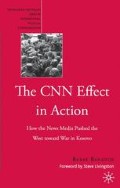Abstract
Prussian military thinker Carl Von Clausewitz is considered the father of modern strategy, based on his 1832 posthumous publication, On War (Vom Kriege). In this classic text, he described war as a remarkable and paradoxical trinity based on three components: popular passions, operational instruments, and political objectives. The first of these relates primarily to the people, the second to the military, and the third to the government. There is debate in the strategy literature on the interpretation of the trinity and the relationship of these three elements. Although some thinkers such as Villacres and Bassford1 suggest that the trinity refers to the different forces within a military campaign, others such as Summers Jr.2 and Van Creveld3 claim that it describes the actors that constitute the social structure of war. This study adopts the latter interpretation of the Clausewitzian trinity.4 In war, all three domains—the people, the military, and the government— are critical to the success of a campaign and the outcome of each area will have profound implications for the others.
Access this chapter
Tax calculation will be finalised at checkout
Purchases are for personal use only
Preview
Unable to display preview. Download preview PDF.
Notes
Harry G. Summers Jr., On Strategy Ii: A Critical Analysis of the Gulf War ( New York: Dell, 1992 ), 11.
John R. Zaller, The Nature and Origins of Mass Opinion ( Cambridge: Cambridge University Press, 1992 ), 28.
Cited in Ole R. Holsti, “Public Opinion and Foreign Policy Analysis: Where We Were, Are, and Should Strive to Be,” in Millennial Reflections on International Studies, ed. Michael Brecher and Frank P. Harvey ( Ann Arbor: University of Michigan Press, 2002 ), 515.
Christopher Coker, Humane Warfare ( London: Routledge, 2001 ), 148.
Michael Howard, “The Dimensions of Strategy,” in War (Oxford Readers), ed. Lawrence Freedman (Oxford: Oxford University Press, 1994 ), 199.
John A. Vasquez, “Foreign Policy, Learning and War,” in New Directions in the Study of Foreign Policy, ed. Charles F. Hermann, Charles W. Kegley Jr., and James N. Rosenau ( Boston: Allen & Unwin, 1987 ), 367.
Cited in Royce J. Ammon, Global Television and the Shaping of World Politics ( Jefferson, NC: McFarland, 2001 ), 6.
Gadi Wolfsfeld, “The News Media and the Second Intifada,” Palestinian-Israeli Journal of Politics, Economics and Culture 10, no. 2 (2003): 9–11.
Johanna Neuman, Lights, Camera, War. Is Media Technology Driving International Politics? ( New York: St. Martin’s Press, 1996 ), 1–2.
Chris Brown, Understanding International Relations ( Basingstoke: Palgrave, 2001 ), 80–83.
Christopher Hill, The Changing Politics of Foreign Policy ( Basingstoke: Palgrave Macmillan, 2002 ), 98.
David M. Barrett, “Presidential Foreign Policy,” in The Making of US Foreign Policy, 2nd Edition, ed. John Dumbrell (Manchester: Manchester University Press, 1997 )
Douglas C. Foyle, Counting the Public In: Presidents, Public Opinion and Foreign Policy ( New York: Columbia University Press, 1997 ).
Graham Allison, Essence of Decision: Explaining the Cuban Missile Crisis ( New York: HarperCollins, 1971 ).
Also see Steve Smith, “Perspectives on the Foreign Policy System: Bureaucratic Politics Approaches,” in Understanding Foreign Policy: The Foreign Policy Systems Approach, ed. Michael Clarke and Brian White (Aldershot, Hants: Edward Elgar, 1989 ), 112–125.
Copyright information
© 2007 Babak Bahador, PhD
About this chapter
Cite this chapter
Bahador, B. (2007). The CNN Effect and War. In: The CNN Effect in Action. Palgrave Macmillan Series in International Political Communication. Palgrave Macmillan, New York. https://doi.org/10.1057/9780230604223_3
Download citation
DOI: https://doi.org/10.1057/9780230604223_3
Publisher Name: Palgrave Macmillan, New York
Print ISBN: 978-1-349-53580-4
Online ISBN: 978-0-230-60422-3
eBook Packages: Palgrave Political & Intern. Studies CollectionPolitical Science and International Studies (R0)

